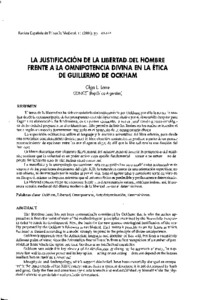Por favor, use este identificador para citar o enlazar este ítem:
https://repositorio.uca.edu.ar/handle/123456789/4963| Título: | La justificación de la libertad del hombre frente a la omnipotencia divina en la ética de Guillermo de Ockham | Autor: | Larre, Olga Lucía | Palabras clave: | Guillermo de Occam, O.F.M., ca. 1285-ca. 1349; FILOSOFIA; FILOSOFIA MEDIEVAL; LIBERTAD; HOMBRE; ETICA; DETERMINISMO | Fecha de publicación: | 2004 | Editorial: | Universidad de Córdoba; España | Cita: | Larre, O. L. La justificación de la libertad del hombre frente a la omnipotencia divina en la ética de Guillermo de Ockham [en línea]. Revista Española de Filosofía Medieval, 11, 2004. doi:10.21071/refime.v11i.9228. Disponible en: https://repositorio.uca.edu.ar/handle/123456789/4963 | Resumen: | Resumen: El tema de Ia libertad no ha sido considerado sistematicamente por Ockham; por ello Ia imtora lo analiza desde Ia circunscripcion de los presupuestos metodologicos transitados por el Venerabilis Inceptor para Ilegar a su elaboracion. Se fundamenta, en un primer momento, Ia nuevajustificacion gnoseo-ontologica de Ia realidad propuesta en el ockhamismo. Ello permite definir los Iimites en los cuales se inscribe el tema segun un modelo fuertemente inspirado en el principio de Ia omnipotencia divina. La exposicion ockhamista utiliza el lenguaje y Ia doctrina aristotelica del libre arbitrio, pero desde una semantica completamente diversa; pues Ia libre eleccion aristotelica se produce a partir de un primer reconocimiento de opciones entre las que el agente elige; de alii que Ia Iibertad resulte una funcion del intelecto. Ockham desestima este elemento fundamental del aristotelismo a! invertir Ia perspectiva del ana!isis; sostiene que Ia voluntad es un poder activo cuya opcion fundamental -actuar o no actuar- no depende del intelecto sino de ella misma como causa sui. La metafisica y Ia antropologia que sostienen esta concepcion han sido modificadas sustancialmente respecto de las posiciones dominantes del siglo XIII: Ia naturaleza carece de una orientacion especifica; no esti abierta, ni determinada por Ia verdad ni por el bien. Solo el agente libre y consciente actila en vista de un fin que el mismo se impone, mientras que el universo fisico es predecible y perfectamente determinado. La libertad aparece como un comienzo frente a Ia determinacion natural, configurandose, asi, Ia primera version medieval del dilema moderno de Ia Iibertad versus el determinismo. Abstract: The freedom issue has not.been systematically considered by Ockham; that is why the author approaches it from the point of view of the methodological principles examined by the Venerabilis Inceptor in order to reach its development. First, the basis for the new gnoseo-ontological justification of the reality proposed by the Ockham's followers is established. That makes it possible to set the limits in which the issue is framed according to a model strongly inspired in the principle of divine omnipotence. Ockham's approach uses the Aristotelian language and doctrine of free will, but from a completely different point of view; since the Aristotelian free will results from a first recognition of a number of possibilities from which the agent opt; then freedom is an intellectual capability. Ockham sets aside this key element of Aristotelianism by changing the approach of study; he supports that will is an active power and its key option -acting or not acting- does not depend on the human intellect but on itself as a causa sui. Metaphysic and Anthropology, which support this belief, have been materially changed as compared to the main trends of the XIII Century: nature lacks a specific direction; it is not determined by truth and good. Only the free and conscious agent acts towards and end established by himself while the physical universe is predictable and perfectly determined. Freedom is shown as a new reality against natural determination, thus shaping the first medieval version for the modern dilemma of freedom versus determinism. |
URI: | https://repositorio.uca.edu.ar/handle/123456789/4963 http://www.uco.es/ucopress/ojs/index.php/refime/article/view/9228 |
ISSN: | 1133-0902 | Disciplina: | FILOSOFIA | DOI: | 10.21071/refime.v11i.9228 | Derechos: | Acceso Abierto | Fuente: | Revista Española de Filosofía Medieval, 11, 2004 |
| Aparece en las colecciones: | Artículos |
Ficheros en este ítem:
| Fichero | Descripción | Tamaño | Formato | |
|---|---|---|---|---|
| justificacion-libertad-hombre-frente.pdf | 863,18 kB | Adobe PDF |  Visualizar/Abrir |
Visualizaciones de página(s)
1.084
comprobado en 30-abr-2024
Descarga(s)
280
comprobado en 30-abr-2024
Google ScholarTM
Ver en Google Scholar
Altmetric
Altmetric
Este ítem está sujeto a una Licencia Creative Commons

